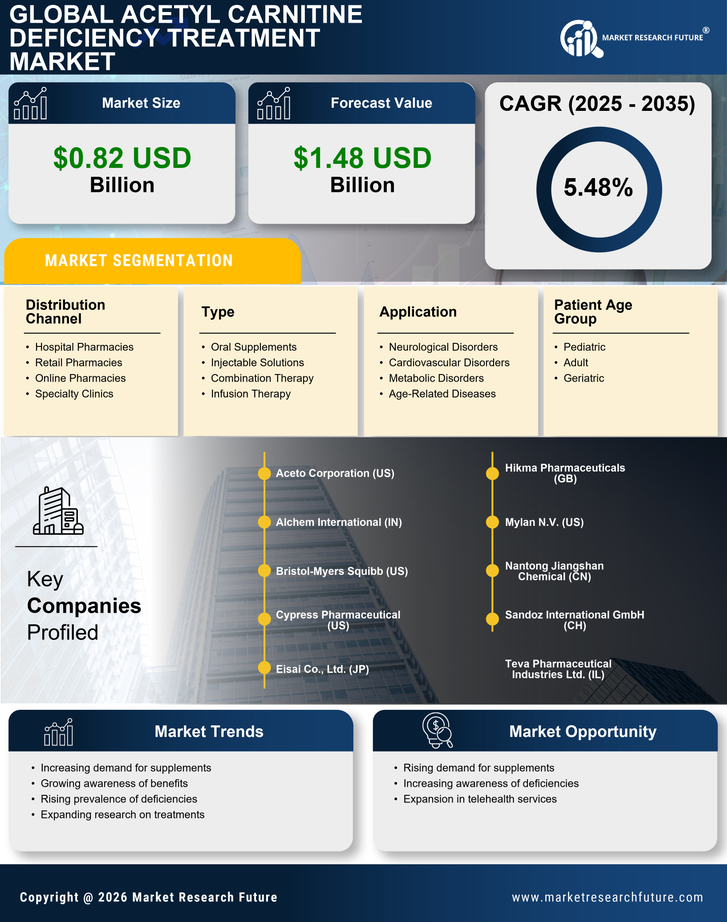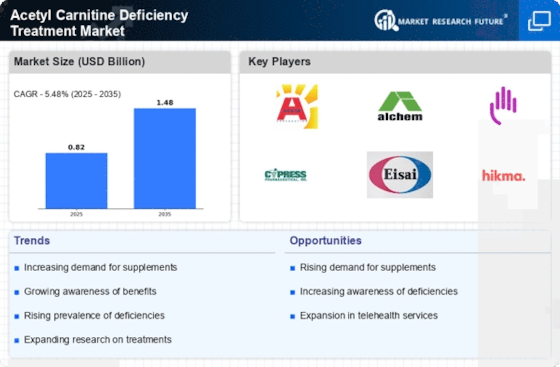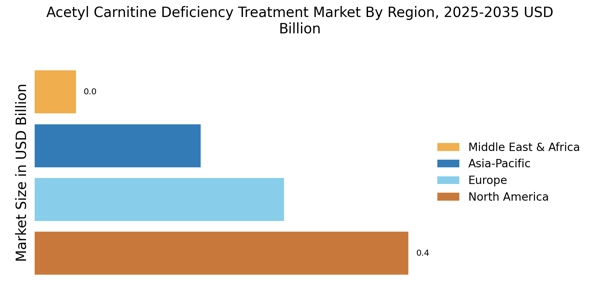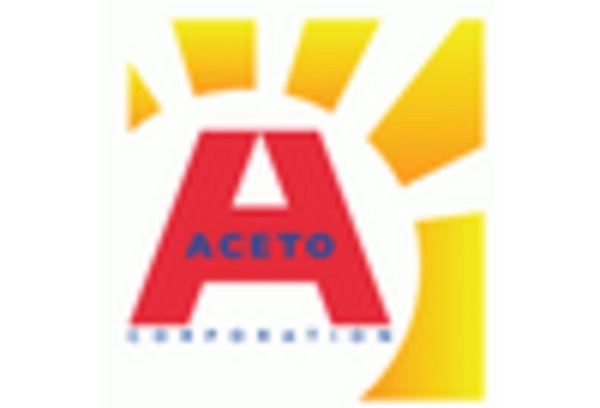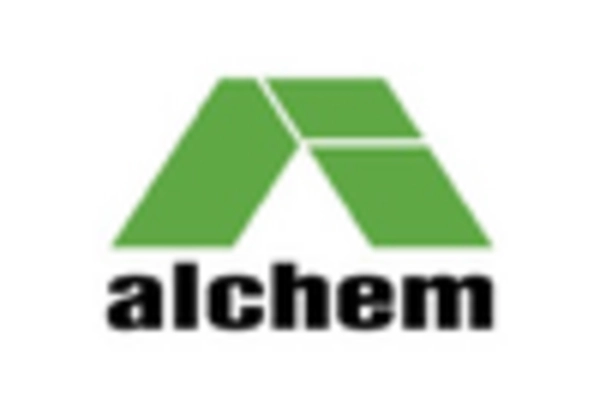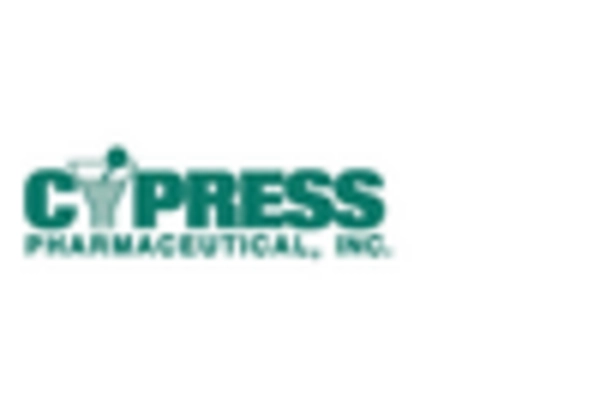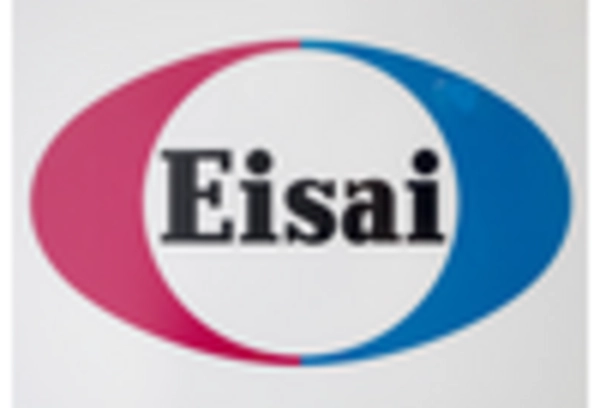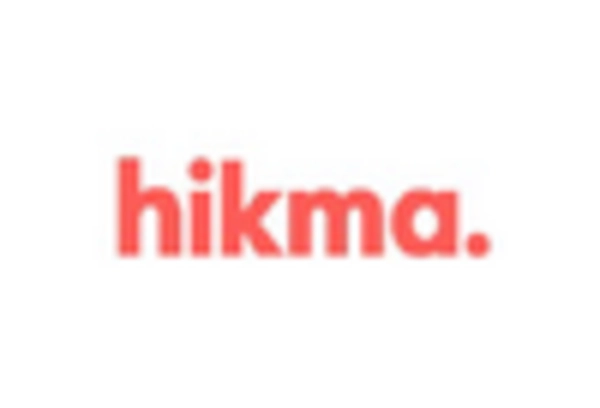Rising Geriatric Population
The increasing geriatric population is a critical driver for the Acetyl Carnitine Deficiency Treatment Market. As individuals age, the risk of Acetyl Carnitine deficiency tends to rise, often leading to cognitive decline and decreased energy levels. The World Health Organization has reported that the global population aged 60 years and older is expected to double by 2050, which suggests a growing market for treatments targeting age-related deficiencies. This demographic shift is likely to result in heightened awareness and demand for Acetyl Carnitine as a potential therapeutic option for improving cognitive function and overall vitality in older adults. Consequently, healthcare providers may increasingly recommend Acetyl Carnitine supplementation, further driving market growth.
Advancements in Research and Development
Ongoing advancements in research and development are propelling the Acetyl Carnitine Deficiency Treatment Market forward. Recent studies have explored the neuroprotective effects of Acetyl Carnitine, particularly in age-related cognitive decline and neurodegenerative diseases. These findings suggest that Acetyl Carnitine may play a crucial role in enhancing brain health, which could lead to increased demand for treatments. Furthermore, the development of new formulations and delivery methods, such as extended-release capsules and liquid forms, is likely to enhance patient compliance and satisfaction. As pharmaceutical companies invest in R&D to explore the full potential of Acetyl Carnitine, the market is expected to witness significant growth, driven by innovative treatment options that cater to diverse patient needs.
Increasing Prevalence of Acetyl Carnitine Deficiency
The rising incidence of Acetyl Carnitine deficiency is a notable driver for the Acetyl Carnitine Deficiency Treatment Market. Research indicates that conditions such as chronic fatigue syndrome, fibromyalgia, and certain metabolic disorders contribute to this deficiency. As awareness of these conditions grows, the demand for effective treatments is likely to increase. In recent years, studies have shown that Acetyl Carnitine supplementation can improve energy levels and cognitive function, further driving market growth. The increasing prevalence of obesity and related metabolic disorders also suggests a potential rise in Acetyl Carnitine deficiency cases, thereby expanding the treatment market. This trend indicates a growing need for healthcare providers to address Acetyl Carnitine deficiency, which could lead to a more robust market for related treatments.
Increased Focus on Mental Health and Cognitive Function
The heightened focus on mental health and cognitive function is emerging as a significant driver for the Acetyl Carnitine Deficiency Treatment Market. As society becomes more aware of the importance of mental well-being, there is a growing interest in supplements that support cognitive health. Acetyl Carnitine has been studied for its potential benefits in enhancing memory, attention, and overall cognitive performance. Market trends indicate that consumers are actively seeking solutions to improve mental clarity and reduce the risk of cognitive decline. This trend is likely to encourage healthcare professionals to recommend Acetyl Carnitine as part of a comprehensive approach to mental health, thereby expanding the treatment market and increasing accessibility to these beneficial products.
Growing Interest in Nutraceuticals and Dietary Supplements
The rising interest in nutraceuticals and dietary supplements is significantly influencing the Acetyl Carnitine Deficiency Treatment Market. Consumers are increasingly seeking natural and holistic approaches to health, leading to a surge in the popularity of dietary supplements that include Acetyl Carnitine. Market data suggests that the dietary supplement sector has experienced substantial growth, with projections indicating a continued upward trend. This shift in consumer behavior is prompting manufacturers to develop a wider range of Acetyl Carnitine products, including powders, capsules, and functional foods. As more individuals turn to supplements for health maintenance and disease prevention, the demand for Acetyl Carnitine products is likely to rise, thereby expanding the treatment market.
